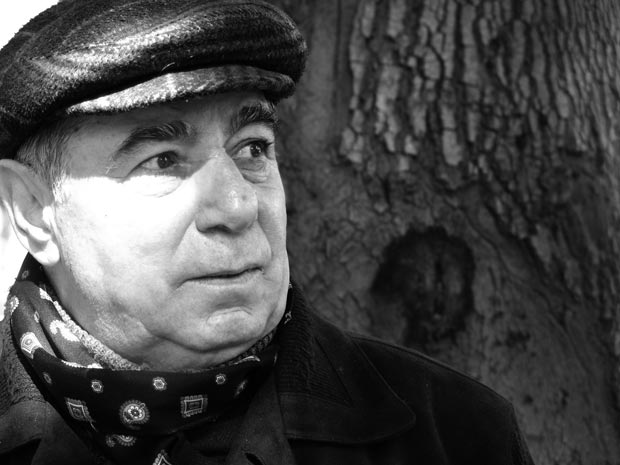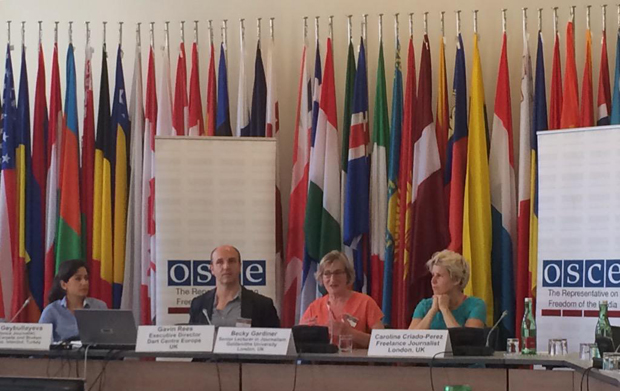22 Apr 2016 | Azerbaijan, Azerbaijan News, Europe and Central Asia, News and features

Akram Aylisli
The case against Azerbaijani writer Akram Aylisli, who previously faced charges of hooliganism after being detained at Baku Haydar Aliyev International Airport on 30 March, has expanded to include charges of resisting the authorities with violence. Under article 315.1 of the criminal code, this is punishable by up to three years in prison.
The move came following an open letter Aylisli sent to Azerbaijani President Ilham Aliyev. In it, he points to the absurdity of the claim that a “78-year-old heart patient, a weak man” could assault a 35-year-old “stocky athlete”. The writer asked the president to intervene and remove the criminal case against him.
“Following [the letter], against all my expectations, my situation rapidly got worse,” Aylisli told Index on Censorship, referring to the new charges. “Also, a new vicious, libellous public campaign against me started in media,” he added.
In March, Aylisli was detained for 12 hours at the airport when he was due to participate in an Italian literary festival. He was accused of assaulting border guards and his travel documents were confiscated.
“Absurdly and illogically, this alleged incident of punching a border guard happened well after the plane departed and was later used by the border service as an explanation for denying the border crossing before the plane had left!” he told Index on Censorship.
Aylisli was once a popular writer in Azerbaijan until 2012 and the publication of his novel Stone Dreams, which tells of the massacres of Armenians in Azerbaijan. His books have since been burned and threats have been made to cut off his ear. Index on Censorship has published one of his short stories, translated into English for the first time, its latest issue.
15 Apr 2016 | Awards, mobile, News and features

Index on Censorship CEO Jodie Ginsberg (Photo: Elina Kansikas for Index on Censorship)
You can donate to Index on Censorship here.
This is the text of a speech give by Index on Censorship CEO Jodie Ginsberg at the Freedom of Expression Awards on April 13, 2016.
In the very first edition of Index on Censorship magazine – published in 1972 – the then editor Michael Scammell wrote that a definite need existed for such an organisation… only time will tell whether the need is temporary or permanent.
Sadly, 43 years later – as evidenced by tonight’s winners – the need seems permanent. Our aim though, remains to be temporary – our goal is nothing less than an end to all censorship. That’s some target, but if those whom we have honoured here this evening have shown us anything, I hope it’s that is this a target worth aiming for.
Index challenges censorship and celebrates the value of free expression in four ways. The first is through the publication of works by censored writers and artists and about censorship.
We do this through our magazine, a copy of which you all receive this evening, and through our website and social media. If you want a reminder of how censorship remains as live an issue as it was in 1972, in this issue you will find a story from Azeri playwright and poet Akram Aylisi, whose books were burned and his title of “People’s Writer” revoked after he dared to discuss the Armenian genocide. Just this month he was barred from leaving the country.
We challenge censorship through campaigning. This year we will be campaigning along with other like-minded organisations to ensure the government’s planned new extremism bill contains none of its proposed new curbs on free speech.
We challenge by encouraging debate such as one held here at Unicorn Theatre last year following the cancellation of Homegrown — whose director Nadia was one of tonight’s guest presenters, by the National Youth Theatre.
And we challenge censorship by supporting those on the frontlines of its defence. Each of tonight’s winners becomes an Index fellow and we will work with them for the next year to help make sure we can magnify their impact at home and abroad.
We have heard stories tonight of what censorship means in practice. Tonight I want to share with you another slice of Index history: a video made for Index 30 years ago that I think drives home all of those stories.
Free expression needs defenders. It needs defenders to ensure that Zunar does not go to prison for 43 years – another Index lifetime – for drawing cartoons of Malaysia’s Prime Minister. It needs defenders to help ensure that the world in which Zaina’s six-week-old baby, who joined her in London this week, grows up to be a woman who can speak freely, and – if she so chooses – report freely. It needs defenders so that Nabeel Rajab, one of this year’s awards judges, is free to travel and speak freely without fear of jail, harassment or torture.
So what I want you to do this evening is very simple. I want you to reach into your programme and take out the pledge card you’ll find there. Then I want you to take a moment to think what you might otherwise have spent this evening. Then I want you to take a pen and write down that figure – or a higher one – to help ensure that Index can continue to defend free speech. If you can’t do analogue, you can text FEXY16 £10 to give us £10 right now. We might not end censorship immediately but with your help we can make ourselves a little less permanent.
Thank you. To end this evening I am delighted to introduce Martyn Ware, who will present our inaugural Music In Exile Fellowship.
The MIEF is a joint initiative with the producers of the film Music in Exile, which explores the plight of Mali’s musicians after jihadists banned music in the country. Moved by their experiences, producers Johanna Schwartz and Sarah Mosses approached Index to see what we could do to support persecuted artists like those featured in the film. Indeed, one group featured, Songhoy Blues, was shortlisted for an Arts award last year. The MIEF, funded through money from special screenings of the film and other events, will support one musician each year as part of the Index awards fellowship. I’m delighted that MW of Human League and Heaven 17 fame is here to present it.
#IndexAwards2016
Index announces winners of 2016 Freedom of Expression Awards
2016 Freedom of Expression Awards: The acceptance speeches
Bolo Bhi: “What’s important is the process, and that we keep at it”
Zaina Erhaim: “I want to give this award to the Syrians who are being terrorised”
GreatFire: “Technology has been used to censor online speech — and to circumvent this censorship”
Murad Subay: “I dedicate this award today to the unknown people who struggle to survive”
Smockey: “The people in Europe don’t know what the governments in Africa do.”
4 Apr 2016 | Azerbaijan, Azerbaijan News, News and features

Akram Aylisli
Violence and lies, Alexander Solzhenitsyn said, always stand side-by-side. Violence can only be concealed by a lie, and the lie can only be maintained by violence.
Violence doesn’t just mean terrorism, which is now happening at unprecedented levels, making us worry for our lives and the fate of our loved ones. It is no less terrifying when it is sneaking into our consciousness, perverting the heart, killing the faith of the good and making us defenceless against ignorance and bigotry. Mercilessly, good is muddled with evil.
A huge amount of people who hold nothing in their soul, or possess something sinister within, hide behind so-called national views and get away with sowing seeds of hatred between peoples and nations who not long ago lived together in peace.
Nationalism is the terrible character of the heartless optimist who rejects tragedy in life, as this completely contradicts his reality. This is a revolt against reason and humanity. It is a blatant lie, told by a fiendish and fierce people who have the audacity to proclaim themselves the sole bearers of truth and as veritable champions of national happiness. Consequently, patriotism imposed from above provides a great opportunity for fascist bastards to transform a people into a mindless mass. But we know those standing closest to the masses to be the most corrupt. Addressing the masses as people is to push them towards evil bigotry.
When you live in sin among sinners, it catches on. But the writer is able, even in the most extreme circumstances, to remain calm and conscious before absolute truth.
“Truth is above Nekrasov, above Pushkin, above the people, above Russia,” wrote Dostoevsky in his time.
“Beware of writers declaring themselves the voice of a nation,” warns a contemporary literary great, Andrey Bitov.
In order to become the darling of the masses, you can write whatever you like in any way. However, becoming kindred to the reader happens for few writers.
All true literature is paved with honesty about the thoughts and feelings of the writer. A writer is not a writer for mass adoration by those who read. He is an authentic expression of indelible moral value to which people entrust pain. And when people start to lose face, the writer suffers most.
A writer is a teacher from the hearts of people and is in no way at fault for politicians’ inability to comprehend such a magical quality.
The mind of the regime does not tolerate the individual views of writers who take on landmark events arising in society. Writers with individual views are horribly and cruelly punished by the regime. In my case the punishment was brutal and unmerciful.
But I shall not let this spread: I do not want to disgrace my little country before a foreign audience. Even after what the current rulers have done to me, I love my country.
My story has plenty of sorrow, but there was also much worth and insight.
It seems with my little essay, now published in Italian as well, I accomplished my main goal: I saved many Armenians from hatred of my people.
I have understood that in this bloody conflict, neither the Armenians or we are to blame – people would never wage war without the interference of politics.
And I have again ascertained that while our nations are good on their own, together they are magnificent.
I always knew going from invisible to visible required suffering. Having taken my own way on this path, I tried not to trip or fall. Evidently, my soul needed definitive torturing to awaken and know itself in the midst of others, those disposed to immediate corruption and seasonal treason.
There are moments in life that last many lifetimes. I was a hero for some and a traitor for others. I never for a moment felt I was a hero or traitor, just a regular writer and humanitarian who is able to feel the pain of others.
I found myself in the same position as Galileo, who never doubted the truth he knew and yet could not use this indisputable truth to break through the rusted hearts of the keepers of dogma.
I was deprived of peace and prosperity for taking a small step in bringing people closer, people who are already related and bound not only by geography, but by the fate of a centuries-old history.
And I have no greater dream than to see them together again.
And I’d like to live to see the light of this day.
This is an extract of the speech Akram Aylisli was due to give at the Italian literary festival Incroci di Civilta last week, before he was prevented from travelling by Baku airport authorities. Aylisi sent the speech to Index and gave it permission to translate and publish it.
A short story by Aylisli is due to be published in the upcoming issue of Index on Censorship magazine.
22 Sep 2015 | Austria, mobile, News and features, United Kingdom

Panelists at the OSCE meet on online attacks against journalists: writer Arzu Geybulla; Gavin Rees, Europe director of the Dart Center for journalism and trauma; Becky Gardiner, from Goldsmiths, University of London; journalist Caroline Criado Perez
“This is not something that only ‘ladies’ can fix,” emphasised Dunja Mijatovic, the OSCE’s Representative on Freedom of the Media at an expert meeting on the safety of female journalists in Vienna on 17 September 2015, which Index on Censorship attended.
The importance of collectively tackling the growing problem became an overarching theme of the conference. “There is a new and alarming trend for women journalists and bloggers to be singled out for online harassment,” said Mijatovic, while highlighting the importance of media, state and NGO voices coming together to address the abuse.
Arzu Geybulla and Caroline Criado Perez, journalists from Azerbaijan and the UK respectively, started the meeting with moving testaments of their own experiences. Despite covering very different topics, they have received shockingly similar threats – sexual, violent and personal. “Shut your mouth or I’ll shut it for you and choke you with my dick” was one of the messages received by Perez after she campaigned for a woman to feature on British banknotes.
Although male journalists also receive abuse, women experience a two-fold attack, including the gendered threats. Think tank Demos has estimated that female journalists experience roughly three times as many abusive comments as their male counterparts on Twitter.
The problem, said Perez, was not just the threats but how the women who receive them are then treated. “Women are accused of being mad or attention seeking, which are all ways of delegitimising women’s speech,” she said. “People told me to stop, close my Twitter account, go offline. But why is the solution to shut up?” She added: “This is a societal problem, not an internet problem.”
“Labelling a person, and making that person an object, is particularly common in Azerbaijan,” said Geybulla, an Azeri journalist and Index on Censorship magazine contributor who was labelled a traitor and viciously targeted online after writing for a Turkish-Armenian newspaper. “Our society is not ready to speak out. You can’t go to the police. The police think it must be your fault.”
The intention of the meeting was to highlight the problem, while also proposing courses of actions. Suggestions included calls for more education in digital literacy; more training for police; more support from editors and media organisations, and from male colleagues. There was some disagreement on whether the laws were robust enough as they stand, or needed an update for the internet age.
Becky Gardiner, formerly editor of Guardian’s Comment is Free section, spoke about how her own views on dealing with online abuse had changed, having initially told writers they should develop a thicker skin. “It is not enough to tell people to get tough. Disarming the comments is not a solution either. That genie is out of the bottle.” Gardiner, who is now a lecturer at Goldsmiths, University of London, is working on research into the issue, as commissioned by the Guardian’s new editor, Kath Viner.
It was suggested that small but crucial steps could be taken by media organisations to avoid inflammatory and misleading headlines (which are not written by the journalist, but put them in the firing line) and to be careful of exposing inexperienced writers without preparation or support. Sarah Jeong from Vice’s Motherboard plaform said, in her experience, freelancers often came the most under attack because they don’t have institutional backing.
The OSCE said this will be the first in a series of meetings, with the aim of getting more organisations to take it serious and to produce more concrete courses of action.
Read more about the online abuse of women in the latest issue of Index on Censorship magazine, with a personal account by Gamergate target Brianna Wu and a legal overview by Greg Lukianoff, president of the Foundation for Individual Rights in Education (Fire).
Tweets from OSCE’s #FemJournoSafe conference:
https://twitter.com/julieposetti/status/644456066432937984



